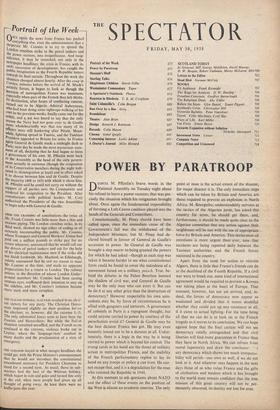— Portrait of the Week O NCE again the news from France
has pushed everything else, even the announcement that a desperate Mr. Cousins is to try to spread the London omnibus strike to the petrol tankers and the power stations, into insignificance. And insig- nificance, it may be remarked, not only in the newspaper headlines; the crisis in France, with its swift succession of developments, has caught the public imagination as the Fourth Republic totters "Wards its final curtain. Throughout the week the situation changed almost hourly. After the coup in Corsica, minutes before the arrival of M. Moch's security forces, it began to, look as though the invasion of metropolitan France was imminent,
especially
when part of the French fleet left Malta. Its destination, after hours of conflicting rumour, turned out to be Algeria. Admiral Auboyneau, who had been doing some tightrope-walking of his Own in the previous weeks, finally came out for the rebels, and a wit was heard to say that the only reason the Navy had not gone over to de Gaulle more wholeheartedly was that too many of its officers were still hankering after Main. Mean- while, fighting spread in Tunisia, and the Tunisian President appealed to Britain for arms. In France again General de Gaulle made a midnight dash to Paris; next day he made the most mysterious state- ment of all, declaring that he had begun to form a government of his own. M. Pflimlin went back to the Assembly as the head of the only govern- ment actually in existence (though the resignation of Its Conservative members during the night inch- Fated its disintegration at least) and in effect asked It to choose between him and de Gaulle. Despite the majority (408 to 165) with which it chose him,
M. Pflimlin said he could not carry on without the support of all parties save the Communists and tendered his resignation to the President. After consultations with political leaders M. Coty authorised the Presidents of the two Assemblies to begin talks with General de Gaulle.
AMID THE CRASHING of constitutions the voice of Mr. Frank Cousins was little more than a thin and anxious piping. The London omnibus strike, in its third week, showed no sign either of ending or of seriously incommoding the public. Mr. Cousins, whose Transport and General Workers' Union had Paid out a million pounds in strike pay for no return whatever, announced that he would call out the drivers of petrol tankers and ask for the help of his electrical maintenance men if the strike did not finish forthwith. Mr. Macleod, in Edinburgh, calmly announced that he saw no reason to meet Mr. Cousins at this time, and made no apparent preparations for a return to London. The railway unions, in the direction of whose London Under- ground members Mr. Cousins had been casting anxious eyes, reaffirmed their intention to stay on the sideline, and Mr. Cousins's isolation became More stark and more complete.
*
THE ITALIAN GENERAL ELECTION resulted in no clear- cut victory for any party. The Christian Demo- crats improved slightly on their position before the election; so, however, did the extreme Lat. The only substantial losers seem to have been the Fascists and Monarchists. But while the Italian situation remained unruffled, and the French scene Confused in the extreme, violence broke out in Ceylon, where the 'language-riots resulted in Many deaths and the proclamation of a state of emergency.
*
THE LEBANON stayed in what meagre headlines she could get, with the Prime Minister's announcement that he would not introduce the constitutional amendment necessary for President Chamoun to stand for a second term. As usual, those in sub- marines had the best of the Whitsun holiday, which began in rain and gales and turned fine only at the end, when most people had given up all thought of going away. At least there were no traffic-jams this year.












































 Previous page
Previous page